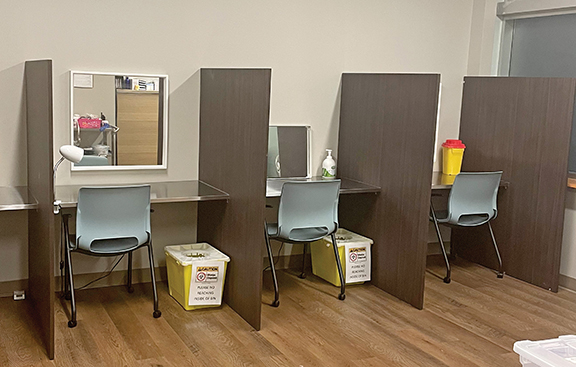GUELPH – The province has officially announced its approval for nine treatment hubs to replace safe-injection sites being forced to close at the end of March, including Guelph’s consumption and treatment services (CTS) site at the Guelph Community Health Centre.
“Through these nine new Homelessness and Addiction Recovery Treatment Hubs, part of our government’s $378-million investment to create a total of 19 hubs across the province, we are taking the next step in our plan to keep communities safe while improving access to mental health and addictions services,” Minister of Health Sylvia Jones stated in a Jan. 2 news release.
In August, the government announced a ban on supervised drug consumption sites within 200 metres of schools and child care centres, which will force the closure of nine publicly funded and one self-funded site effective March 31.
At the same time, it announced the plan to invest in treatment hubs, saying CTS sites were encouraged to submit proposals to transition to the HART Hub model.
At the time, critics of the plan predicted it would result in more drug poisonings and an increased burden to the health care system.
The government stated the hubs could be eligible for “up to four times more funding” than the CTS sites they are to replace, but the services offered would be different.
For example, safer supply, supervised drug consumption and needle exchange programs are not to be included in the HART Hub model. Instead, the government states the hubs will connect people with complex needs to “comprehensive treatment and preventative services.”
The Guelph Community Health Centre submitted its HART Hub application in October with the expectation that proposals from transitioning CTS sites would be prioritized.
On Jan. 2, the province stated all nine applications from provincially-funded CTS sites – located in Toronto, Ottawa, Hamilton, Kitchener, Guelph and Thunder Bay – had been approved.
Little comment came from the Guelph Community Health Centre regarding the news.
“We are so grateful that Guelph CHC has been approved for a HART Hub,” director of integrated programs Sarah Haanstra stated in an email response to an Advertiser inquiry.
But she did not answer questions about what the new hub might look like, the services it would provide, funding that might be coming, or housing that might be connected.
“We are still waiting on additional details from the province about what this means for Guelph, and it’s premature to discuss until we know more,” Haanstra said.
The province has stated the nine approved HART Hub sites will be transitioned from “drug injection sites” by March 31.
“Applications for the remaining HART Hubs are under review and will be announced in the coming weeks,” the release stated.
“All HART Hubs will have the goal of being operational by April 1, 2025.”
To assist with the transition, the sites are to receive one-time funding for start-up costs, it stated, but there was no word on how much money that might be.
The release also mentions housing as a part of the HART Hub transition, saying the hubs will add an estimated 375 “highly supportive housing units.”
But Guelph Community Health Centre CEO Melissa Kwiatkowski told the county’s joint social services and land ambulance committee in October that there would be no new buildings allowed to create housing units as part of the transition.
She said the health and housing communities would be working together to see what can be done with existing buildings to provide additional supportive housing.
The province has created legislation to prohibit municipalities or local boards from participating in federal safer-supply programs.
In the news release, Guelph Mayor Cam Guthrie called the announcement of the HART Hub approval for Guelph “exciting news for our community,” offering thanks to the provincial government and the minister of health for their support.
“It’s exciting due to the supports that can now set individuals on a positive trajectory of lifelong success free from the addictions that are currently harming them, and in most cases impacting their family and friends as well,” Guthrie stated.
Some politicians have been less positive about the transition plan.
In December, Ontario Green Party leader Mike Schreiner and deputy leader Aislinn Clancy joined drug strategy professionals and service providers in calling for a “value-for-money audit” of the decision to close CTS sites.
Referencing a recent Auditor General’s report, Clancy stated in a Dec. 4 news release that the decision to close CTS sites was made without proper planning or public consultation.
“If the Ford government had taken the time to consult with anybody, it would know that these closures are going to cost money and lives and make our communities less safe,” stated Clancy.
“Greens will continue fighting to reverse these cruel and unjust closures.”
Wellington Guelph Drug Strategy manager Jean Hopkins noted in the release that removing CTS sites will increase the more costly use of EMS and hospital emergency departments.
“This is why we are requesting the value for money audit – we need a full picture of what the financial impacts will be after these sites close,” Hopkins stated.
Reached via email, Hopkins told the Advertiser the HART Hub investment is welcomed by the organization, but it only addresses one aspect of the issue.
“The Wellington Guelph Drug Strategy works from a model that recognizes the importance of taking a four-pillared approach – that includes prevention, harm reduction, treatment and recovery, and community safety,” Hopkins stated.
The HART Hub model will address one of these pillars by adding additional treatment, she said.
To respond effectively to the drug toxicity that continues to impact Guelph and Wellington County, “We still need all options, including CTS, to keep people safe,” Hopkins stated.
“Closing CTS will directly lead to higher numbers of fatalities in our community, public substance use and EMS calls.
“Treatment and harm reduction services are two essential pieces in a continuum of services for people struggling with their substance use.”



